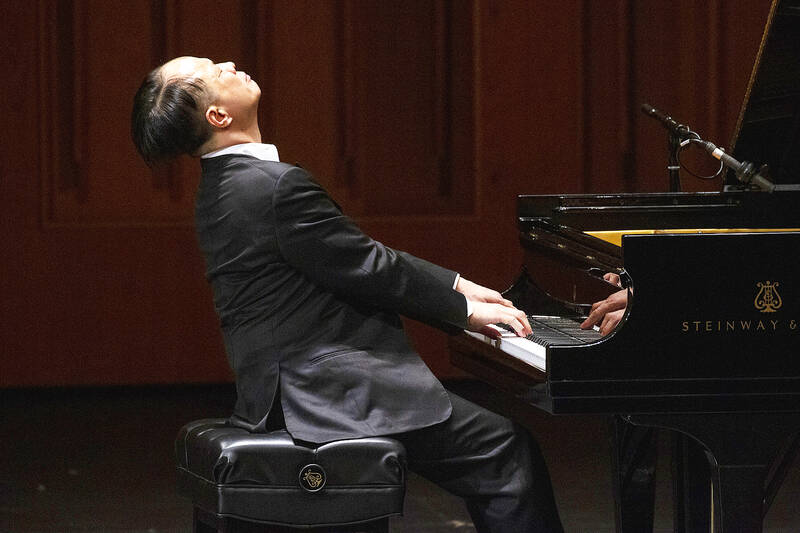Internationally acclaimed pianist Chen Ruei-bin (陳瑞斌) will be marking the 40th anniversary of the death of talented Taiwanese composer Chiang Wen-ye (江文也) at his concert next Tuesday.
Chen, who was born in Taiwan and moved to Austria to study music as a teenager, has been promoting Chiang’s work across the globe for many years. Chiang died on Oct. 24, 1983.
Chiang, a Hakka who’s been dubbed the “Chopin of the East,” also left Taiwan at a young age, studying in Japan and later working in Beijing as a music professor. He remained in China after the Chinese Civil War and never returned home.

Photo courtesy of Chen Ruei-bin
Chiang often expressed his yearning for his homeland in his work — including Formosan Dance (台灣舞曲), which won a medal for music during the 1936 Olympics. This made Chiang the first Taiwanese to win an Olympic medal and the only Asian to ever win a music medal in Olympic history.
Chen will be presenting Formosan Dance alongside two other works of Chiang at his upcoming recital at the National Concert Hall.
He says that he can hear Chiang’s profound nostalgia and longing for Taiwan in the piece, and the pain of not being able to return home deeply resonates with him.
In addition to Chiang’s pieces, Chen will also perform a number of works by European composers that have been featured in popular movies and dramas — including Chopin’s Balakirev: Transcription of Romance from Chopin’s Piano Concerto No.1 that appeared in the hit Korean drama Stairway to Heaven, as well as Variation 18 of Sergei Rachmaninoff’s Rhapsody on a Theme of Paganini from the beloved American classic Somewhere in Time.
■ Tuesday at 7:30pm, National Concert Hall, 21-1 Zhongshan S Rd, Taipei City (台北市中山南路21-1號), tickets range from NT$300 to NT$5,200
■ On the Net: www.facebook.com/rcpianist

The Democratic Progressive Party (DPP), Chinese Nationalist Party (KMT), and the country’s other political groups dare not offend religious groups, says Chen Lih-ming (陳立民), founder of the Taiwan Anti-Religion Alliance (台灣反宗教者聯盟). “It’s the same in other democracies, of course, but because political struggles in Taiwan are extraordinarily fierce, you’ll see candidates visiting several temples each day ahead of elections. That adds impetus to religion here,” says the retired college lecturer. In Japan’s most recent election, the Liberal Democratic Party lost many votes because of its ties to the Unification Church (“the Moonies”). Chen contrasts the progress made by anti-religion movements in

Taiwan doesn’t have a lot of railways, but its network has plenty of history. The government-owned entity that last year became the Taiwan Railway Corp (TRC) has been operating trains since 1891. During the 1895-1945 period of Japanese rule, the colonial government made huge investments in rail infrastructure. The northern port city of Keelung was connected to Kaohsiung in the south. New lines appeared in Pingtung, Yilan and the Hualien-Taitung region. Railway enthusiasts exploring Taiwan will find plenty to amuse themselves. Taipei will soon gain its second rail-themed museum. Elsewhere there’s a number of endearing branch lines and rolling-stock collections, some

Last week the State Department made several small changes to its Web information on Taiwan. First, it removed a statement saying that the US “does not support Taiwan independence.” The current statement now reads: “We oppose any unilateral changes to the status quo from either side. We expect cross-strait differences to be resolved by peaceful means, free from coercion, in a manner acceptable to the people on both sides of the Strait.” In 2022 the administration of Joe Biden also removed that verbiage, but after a month of pressure from the People’s Republic of China (PRC), reinstated it. The American

This was not supposed to be an election year. The local media is billing it as the “2025 great recall era” (2025大罷免時代) or the “2025 great recall wave” (2025大罷免潮), with many now just shortening it to “great recall.” As of this writing the number of campaigns that have submitted the requisite one percent of eligible voters signatures in legislative districts is 51 — 35 targeting Chinese Nationalist Party (KMT) caucus lawmakers and 16 targeting Democratic Progressive Party (DPP) lawmakers. The pan-green side has more as they started earlier. Many recall campaigns are billing themselves as “Winter Bluebirds” after the “Bluebird Action”